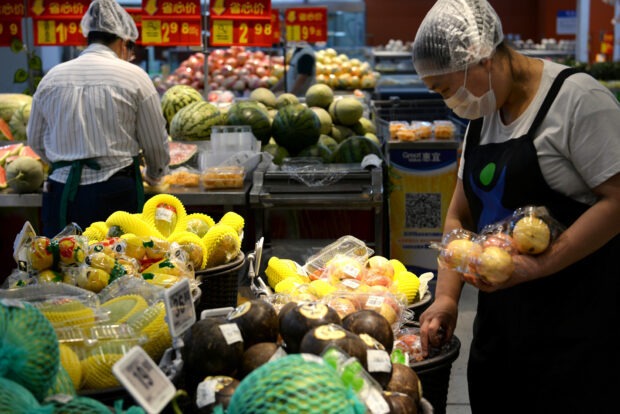
Staff sort fruits at a Walmart in Beijing, China, September 23, 2019. Picture taken September 23, 2019. REUTERS/Tingshu Wang/File photo
BEIJING -China’s consumer prices fell into deflation in July, while factory gate prices extended their declines, as the world’s second-largest economy struggled to revive demand and pressure mounted for authorities to release more direct stimulus.
The consumer price index (CPI) for the month dropped 0.3 percent year-on-year, the National Bureau of Statistics (NBS) said, a slightly slower fall than the median estimate for a 0.4- percent decrease in a Reuters poll. It was the first year-on-year decline since February 2021. CPI was unchanged in June.
The producer price index (PPI) fell for a 10th consecutive month, down 4.4 percent from a year earlier after a 5.4- percent drop the previous month. That compared with a forecast for a 4.1- percent fall.
China’s economic recovery slowed after a brisk start in the first quarter, as demand at home and abroad weakened. Authorities have rolled out a flurry of policy measures to support the economy, with more steps expected.
The drop in consumer prices is more cause for concern with mounting deflation pressures amid faltering economic growth due to persistent property downturn and falls in imports and exports.
READ: White-collar wage cuts in China fuel deflation risks, hurt consumption
However, authorities have downplayed concerns about deflation. Liu Guoqiang, deputy governor of the central bank, last month said there would be no deflationary risks in China in the second half of the year, but noted the economy needs time to return to normal after the pandemic.
The government has set a consumer inflation target of around 3 percent this year, which be up from 2 percent recorded in 2022.
READ: China June inflation flat as economy struggles
Despite recent policy stimulus, consumers and manufacturers remained cautious amid the still-weak housing market and high youth unemployment, and a diminishing appetite among foreign firms to invest in China.
Investors have been anxiously waiting for policymakers to inject stimulus measures after the powerful Politburo meeting last month, with the stock market mostly underwhelmed by the lack of concrete actions.


